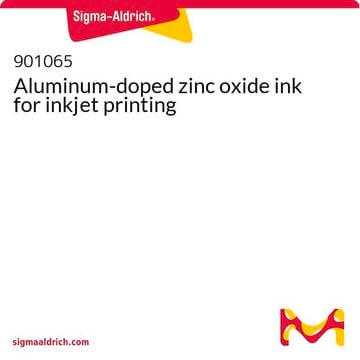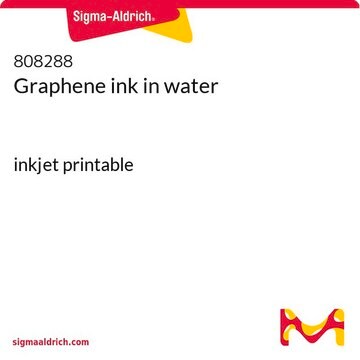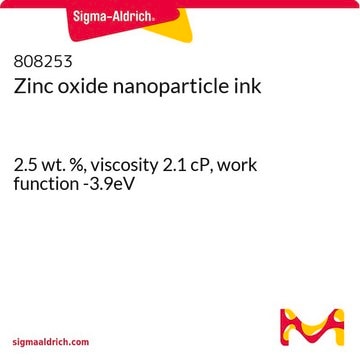901091
Zinc oxide ink for inkjet printing
Synonym(s):
Helios′Ink H-SZ01034 semiconductive ink, Zinc oxide dispersion, Zinc oxide suspension, ZnO ink, ZnO nanoparticle ink
About This Item
Recommended Products
description
Conductivity: 10-8-10-7 S/cm (before illumination) and 10-4-10-3 S/cm (under illumination with UV light)
Valence band: 7.9 ± 0.1 eV
Work function: 4.0 ± 0.1 eV
Quality Level
form
liquid (dispersion)
greener alternative product characteristics
Design for Energy Efficiency
Learn more about the Principles of Green Chemistry.
sustainability
Greener Alternative Product
color
slightly yellow to clear
surface tension
29 mN/m±5 mN/m
viscosity
10.5 mPa.s±3.0 mPa.s(20 °C)
capacity
≥0.9 % loading (Nanoparticles loading)
greener alternative category
General description
Features and Benefits
- Easy deposition under atmospheric conditions (temperature and pressure).
- Good optical performances (visible light transmission >90%).
- Non CMR ink.
- Compatible with ITO layer and Ag NWs layer.
- Compatible with most flexible substrates.
- Low drying temperature making printing onto flexible substrates possible.
- Thin layers are obtained (20 nm) with low roughness (RMS = 3±1 nm).
Preparation Note
- Can be homogenized for 5 minutes in an ultrasonic bath in order to get rid of any aggregates.
- Filtration on a 0.45 μm PTFE filter syringe to avoid any nozzles clogging.
- Drying conditions: Oven, IR oven, vacuum oven.
- Clean-up solution: Ethanol/Acetone.
Legal Information
Signal Word
Danger
Hazard Statements
Precautionary Statements
Hazard Classifications
Acute Tox. 4 Oral - Aquatic Chronic 3 - Eye Dam. 1 - Flam. Liq. 3 - Skin Irrit. 2 - STOT SE 3
Target Organs
Central nervous system, Respiratory system
Storage Class Code
3 - Flammable liquids
WGK
WGK 1
Flash Point(F)
111.2 °F - closed cup
Flash Point(C)
44 °C - closed cup
Choose from one of the most recent versions:
Already Own This Product?
Find documentation for the products that you have recently purchased in the Document Library.
Customers Also Viewed
Articles
Recent advancements in paper-based sensing platforms offer cost-effective clinical diagnostics with microfluidic channels and colorimetric or electrochemical detection zones.
Recent advancements in paper-based sensing platforms offer cost-effective clinical diagnostics with microfluidic channels and colorimetric or electrochemical detection zones.
Recent advancements in paper-based sensing platforms offer cost-effective clinical diagnostics with microfluidic channels and colorimetric or electrochemical detection zones.
Recent advancements in paper-based sensing platforms offer cost-effective clinical diagnostics with microfluidic channels and colorimetric or electrochemical detection zones.
Our team of scientists has experience in all areas of research including Life Science, Material Science, Chemical Synthesis, Chromatography, Analytical and many others.
Contact Technical Service










